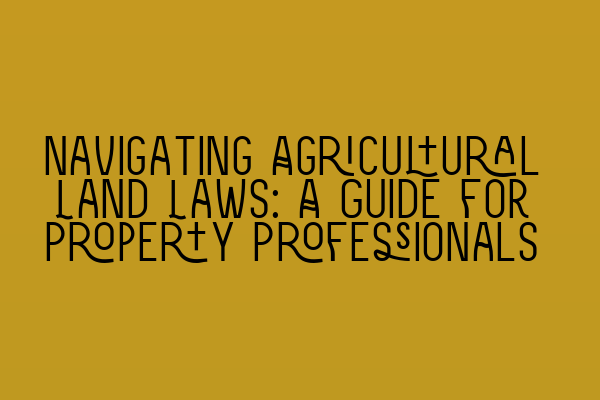Navigating Agricultural Land Laws: A Guide for Property Professionals
As a property professional, it is crucial to have a comprehensive understanding of the intricate legal framework surrounding agricultural land. Agricultural land laws play a vital role in the use, ownership, and development of rural properties. In this guide, we will explore the key aspects of agricultural land laws, providing you with the knowledge and tools necessary to navigate this complex area of property law successfully.
Understanding Agricultural Land Laws
Agricultural land laws encompass a wide range of legal principles and regulations that govern the ownership, use, and development of land primarily used for agricultural purposes. These laws aim to strike a balance between protecting agricultural activities and promoting sustainable land use practices.
The laws relating to agricultural land can vary significantly between jurisdictions. It is essential to consult the specific legislation relevant to your region to ensure compliance and mitigate potential legal risks. Some general principles, however, apply across many jurisdictions when it comes to agricultural land laws.
1. Planning and Zoning Regulations:
One of the fundamental aspects of agricultural land laws revolves around planning and zoning regulations. These laws dictate how land can be used and developed within specified zones. Agricultural land is often designated as agricultural zones, limiting its use for agricultural activities primarily. Establishing the land’s zoning classification is crucial in determining what activities are permissible and can affect your ability to undertake certain activities on the land.
2. Environmental and Conservation Regulations:
Environmental and conservation regulations are another essential component of agricultural land laws. These regulations are designed to protect and preserve the natural resources and biodiversity associated with agricultural land. Compliance with environmental standards and regulations is crucial to mitigate any adverse environmental impact arising from agricultural activities.
3. Tenancy and Leasehold Agreements:
Agricultural land is commonly subject to tenancy and leasehold arrangements. Agricultural tenancies are often long-term in nature and governed by specific legislation designed to protect the rights and interests of both the landlord and the tenant. Understanding the different types of tenancies and leasehold arrangements can help ensure that transactions involving agricultural land are legally sound and equitable for all parties involved.
4. Common Agricultural Policy (CAP):
In the European Union and some other jurisdictions, the Common Agricultural Policy (CAP) sets out the rules and regulations for agricultural subsidies and support. Familiarizing yourself with CAP regulations is essential for property professionals operating within these jurisdictions, as non-compliance may result in the loss of financial support or penalties.
5. Succession Planning and Inheritance:
Succession planning and inheritance laws are particularly relevant for agricultural land, as the continuity and transfer of family-owned farms and rural estates are often at stake. Understanding the legal implications of succession planning and inheritance laws can facilitate smooth transitions, prevent disputes, and ensure the preservation of agricultural land for future generations.
Conclusion
Navigating agricultural land laws is a complex task for property professionals. It requires an in-depth understanding of various legal principles and regulations governing land use, ownership, and development. By familiarizing yourself with the planning and zoning regulations, environmental and conservation regulations, tenancy and leasehold agreements, common agricultural policy, and succession planning and inheritance laws, you can effectively navigate the legal landscape surrounding agricultural land.
At SQE Property Law & Land Law, we offer comprehensive legal services and expert advice to property professionals operating in the agricultural sector. Our team of experienced solicitors can assist with a wide range of legal matters, providing tailored solutions to meet your specific needs. Contact us today to learn more about how we can support your agricultural property needs.
Related Articles:
– SQE Contract Law: Analyzing Landmark Cases and Influential Judicial Decisions
– Understanding Contractual Capacity: Rights and Limitations
– Interactive SQE Mock Tests for Contract Law: Test Your Knowledge
– Join Our SQE Contract Law Webinars: Expert Insights and Guidance
– SQE Prep: Mastering the Essentials of Contract Law
